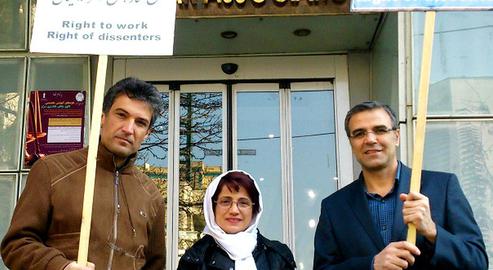In the photographs published by the British media, Foreign Secretary Jeremy Hunt and four-year-old Gabriella smile at each other, a collection of books and toys in front of them. But across Tehran, in Evin Prison, Gabriella’s mother Nazanin Zaghari-Ratcliffe was anxious, tense, her stomach a bundle of nerves, "like a dishwasher," her husband Richard Ratcliffe said.
After speaking to her husband on the morning of November 20, Zaghari-Ratcliffe was said to be somewhat reassured. Hunt had made it clear that her continued imprisonment was “unacceptable,” Richard told her.
“Jeremy Hunt’s tone was much more robust than we expected,” said Richard Ratcliffe in a telephone conversation with IranWire. Throughout Zaghari-Ratcliffe’s incarceration, which followed her arrest in spring 2016, British officials had “usually talked in code,” he said. “But we asked him [Foreign Secretary Hunt] to be clear and consistent.” This straightforward, clear approach was also evident in the foreign secretary's tweet on November 20: "No child should have to go this long without their mother. #FreeNazanin.” Such a stance can only help ease tensions between the two countries, Ratcliffe says, and hopefully prevent what is already a complicated and unstable situation becoming more fraught. He added that the family was “genuinely grateful” for Hunt’s efforts.
A Change of Tone
Shortly after Hunt was appointed in July 2018, he pledged to prioritize the case, tweeting "We must redouble efforts to find a way to get her home."
This week Hunt was on his first trip to the Iranian capital as foreign secretary, where he has met with his counterpart, Foreign Secretary Mohammad Javid Zarif and key military figure Ali Shamkari, who heads up the powerful Supreme National Security Council.
Top on the agenda during his visit was how to increase trade and business between Iran and the UK and how to keep the Joint Plan of Comprehensive Action, the nuclear deal, intact after the US withdrawal from the agreement earlier this year.
Although Hunt has not spoken in any conditional terms about Zaghari-Ratcliffe’s release and the UK’s business dealings with the Islamic Republic, he has repeatedly made it clear that keeping innocent Iranian-British people behind bars is “not a good way to do business,” as Richard Ratcliffe puts it. “Iranians want Iran to be a normal country, not a pariah state. And so it should observe the basic norms of civility.” He called for an end to Iran's "outrageous" practice of using innocent people as “bargaining chips” to apply pressure to governments, and even within Iran’s internal complex political establishment. Other Iranian-British dual nationals currently being held in Iran include the elderly Kamal Foroughi, who was accused of spying.
Foreign Secretary Hunt’s visit to Tehran has attracted media attention both within Iran and in the international community — not always the case with a British foreign secretary’s visits abroad these days, as the BBC's James Landale points out. Several Iranian news agencies ran stories about the visit, including the famous reformist Shargh newspaper.
For their part, Richard Ratcliffe said several Iranian officials appeared to be “drawing in a breath" during the visit, many of them wary of losing British support as business deals hang in the balance and the US-imposed sanctions continue to dig in. But they have not wavered in their reluctance to accept that Zaghari-Ratcliffe is not guilty of charges of trying to "overthrow" the regime.
Asserting Authority in a Time of Vulnerability
While Richard Ratcliffe applauded Jeremy Hunt’s efforts, he conceded that there was much more to do to secure his wife’s release and to bring her and Gabriella — who he has not seen in person since Zaghari-Ratcliffe’s arrest — home to the UK. His wife might have been reassured by Hunt’s clear, consistent message, but "it would be a stretch to say she is hopeful," he said. She remains fragile, “conspicuously suffering,” and is regularly denied medical attention — although she is not alone. In general, prison conditions have deteriorated in recent months, not just for Zaghari-Ratcliffe, but for many prisoners held in Evin. In many cases, family visits have been more complicated to arrange, and items that were once allowed into the prison have been banned. Security agencies are more closely policing the prison, a probable sign that the regime is feeling vulnerable and believes it needs to assert its authority, says Ratcliffe.
Ratcliffe and the Free Nazanin campaign are clear on their task: to keep the British government focused and to ensure it continues to raise Zaghari-Ratcliffe’s case, and the cases of other unjustly held British citizens, with Iranian officials and to do everything it can to bring about their release. He reiterates that the UK government must pressure the Iranian government, led by President Hassan Rouhani, which in turn must pressure the Revolutionary Guards Corps — which is essentially responsible for Zaghari-Ratcliffe's arrest and continued detention. Richard Ratcliffe insists the family and their supporters will continue to resist being drawn into a power game. Instead, he urges the UK and Iran to acknowledge the “points of commonality” between them, which, at their most simple mean an acceptance that holding an innocent woman behind bars for political gain can never secure what Iran wants and so badly needs: stability, a healthy economy and a secure future.
visit the accountability section
In this section of Iran Wire, you can contact the officials and launch your campaign for various problems

























comments